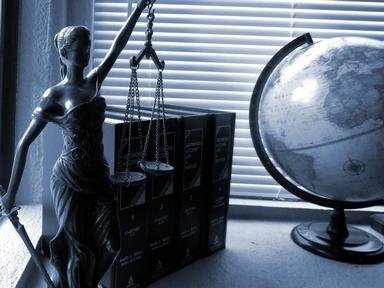Quiz Answer Key and Fun Facts
1. American courts are no stranger to lawsuits brought by prison inmates alleging civil rights violations. In 1995, Robert Lee Brock, a prisoner in Chesapeake, Virginia, came up with a novel way to complain that his civil rights had been infringed. Who was his suit against?
2. In 2006, Curtis Gokey commenced a suit against the city of Lodi, California for damage done to his parked vehicle when a city dump truck backed into it negligently. His claim was not allowed, however, due to a fatal flaw. What was the problem?
3. Wells Fargo, one of the Big Four U.S. banks, came under scrutiny in July 2009 when it sued itself in Hillsborough County Court during the height of the subprime mortgage crisis. What was the purpose of the suit?
4. Fantasy, Inc. v. Fogerty was a copyright infringement suit over the alleged similarities between Creedence Clearwater Revival's 1970 hit, "Run Through the Jungle", and John Fogerty's 1985 hit, "The Old Man Down the Road". What was one unusual feature of the case?
5. In November 2008, a news story broke about a potential lawsuit that could colloquially be described as "Batman v. Batman". The defendant in this case would have been Christopher Nolan and Warner Bros., the film director and studio responsible for the 2008 blockbuster, "The Dark Knight". Who (or what) would have been the plaintiff?
6. When the popular animated TV show "The Simpsons" made fun of a certain TV news channel in October 2003, media reports claimed that the news channel was thinking of suing. That move would have pit two sibling companies against each other, since "The Simpsons" was broadcast on the same television network. Which TV network was this?
7. In 2007, Islington borough council in London, England, issued a parking ticket to one of its own vehicles, appealed to itself in an attempt to avoid paying the fine, and, in the course of a further appeal before the Parking and Traffic Adjudicator, sought costs against itself.
8. When executives of The Coca-Cola Company sought legal advice in 2007 about the possibility of Coke Classic suing Coke Zero, the advice they received was that they would effectively be suing themselves. Luckily for the company, no suit materialized. What was the real story behind this bizarre development?
9. In 2005, Illinois attorney Emert Wyss advised his client, Carmelita McLaughlin, to sue her mortgage holder to recover some improper fees she had been charged when she refinanced her home. This turned out to be a mistake on his part. In what way did Emert Wyss end up suing himself?
10. In 1985, Oreste Lodi sued himself in the Shasta County Superior Court in California. Dissatisfied with the outcome of that suit, he appealed. What, according to the Court of Appeals of California (Third District), was the outcome of the case?
Source: Author
jmorrow
This quiz was reviewed by FunTrivia editor
stedman before going online.
Any errors found in FunTrivia content are routinely corrected through our feedback system.

